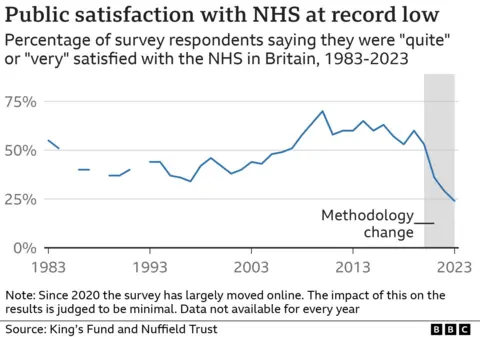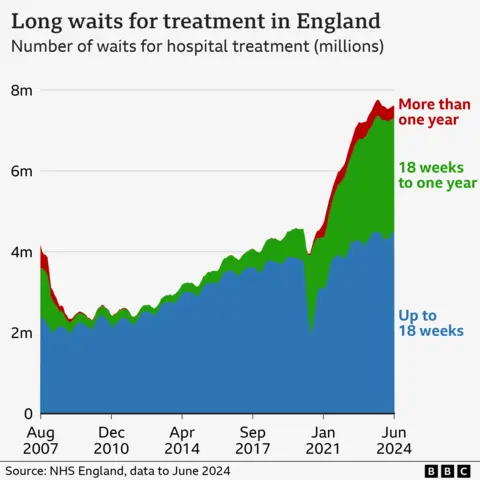World
No extra NHS funding without reform, says PM

 Getty Images
Getty ImagesThere will be no extra NHS funding without reform, Sir Keir Starmer says, as he promised to draw up a new 10-year plan for the health service.
The pledge came after a damning report warned the NHS in England was in a “critical condition”.
The prime minister said the new plan, expected to be published in the spring, would be the “the biggest re-imagining of the NHS” since it was formed.
He set out three key areas for reform – the transition to a digital NHS, moving more care from hospitals to communities, and focusing efforts on prevention over sickness.
But the Conservatives said the government needed to turn “rhetoric to action” after scrapping its plans to reform social care and build new hospitals.
The report was the result of a nine-week review by the independent peer and NHS surgeon Lord Darzi.
He was asked by Labour, shortly after the election, to identify the failings in the health service, but his remit did not stretch to coming up with solutions.
His findings present a stark picture of a service which he says is in “serious trouble” with declining productivity and putting patients at risk because of “ballooning” waits and “awful” emergency services.
Responding to the report during a speech in London, Sir Keir said the problems would not be solved by just more money.
“We can’t duck long-term change. This isn’t just going to be solved by more money, it’s solved by reform.”
Sir Keir said it would be “so different” from everything that has gone before as he talked about changing it into a “neighbourhood health service”.
This would mean “more tests, scans and healthcare offered on high streets and towns centres” alongside bringing back the family doctor and offering digital consultations to those who want them.
“Hear me when I say this – no more money without reform.”
The report from Lord Darzi, who served as health minister in the last Labour government, said the NHS was still struggling with the aftershocks of the pandemic and falling well short of its key targets for cancer, Accident & Emergency (A&E) and hospital treatment.
It said this was contributing to poor survival rates in cancer and heart disease, and falling rates of satisfaction with the service.

The report said the NHS had been left chronically weakened by the policy of austerity of the 2010s and, in particular, a lack of investment in buildings and technology.
The NHS has crumbling hospitals, fewer scanners than many other developed nations and is years behind the private sector in terms of digital innovation, it says.
This has contributed to falling levels of productivity in hospitals, with rises in staff outstripped by increasing numbers of patients needing care.
It has meant hospitals have been sucking up an ever-increasing amount of the budget, when more care should be shifted into the community.
Lord Darzi was also critical of the “disastrous” 2012 reforms introduced by the coalition government, which led to a shake-up of management structure in the NHS and acted as a distraction for the rest of the decade.
‘Ballooning’
It said all this contributed to the NHS entering the pandemic in a depleted state, leading to the cancellation of more hospital treatments than any comparable country and the “ballooning” waiting list, which currently stands at 7.6 million.
Meanwhile, a surge in patients suffering several long-term illnesses, such as diabetes, high blood pressure and respiratory illness, is threatening to overwhelm the NHS alongside soaring levels of mental health problems among young people.
Lord Darzi said: “Although I have worked in the NHS for more than 30 years, I have been shocked by what I have found during this investigation – not just in the health service, but in the state of the nation’s health.”
Although the report focused on the NHS, Lord Darzi also warned of the “dire” state of social care, which he said was not “valued or resourced sufficiently”.
The growing gap between people’s needs and availability of publicly-funded social care in England was placing “an increasingly large burden on families and on the NHS”, he said.

Shadow health secretary Victoria Atkins said the government had yet to come up with meaningful plans for reform.
“The Labour government will be judged on its actions. It has stopped new hospitals from being built, scrapped our social care reforms and taken money from pensioners to fund unsustainable pay rises with no gains in productivity.”
She also defended the Conservative government’s record, saying the NHS budget had been increased during the last Parliament.
Former Conservative health minister Lord Bethell, who served for 18 months during the pandemic, said action was taken by the previous government, although “maybe not enough”.
He told BBC Radio 4’s The World Tonight that the reason money was not spent was not “some kind of conspiracy to wreck the NHS” – but because “it has been impossible to persuade the Treasury that we will get a return on investment by investing in NHS capital”.
‘Deeply troubling’
Matthew Taylor, the head of the NHS Confederation, which speaks on behalf of NHS organisations and their 1.5 million employees, said the report had identified some of the problems facing the health service.
But he warned that waiting lists would probably get even longer this winter – as normally happens.
“It will take at least a full term for Labour to get anywhere near the kinds of targets they’ve got for waiting lists,” he said.
Thea Stein, chief executive of the Nuffield Trust think tank, said while Lord Darzi’s report was “not surprising” it was still “deeply troubling”.
“The big question now is what happens next.”
William Pett, of the patient watchdog Healthwatch England, said the problems needed to be addressed, describing services as “in disarray” and waiting times as “excessive”.
He added: “These challenges are not experienced equally, with poorer communities hit hardest.”











